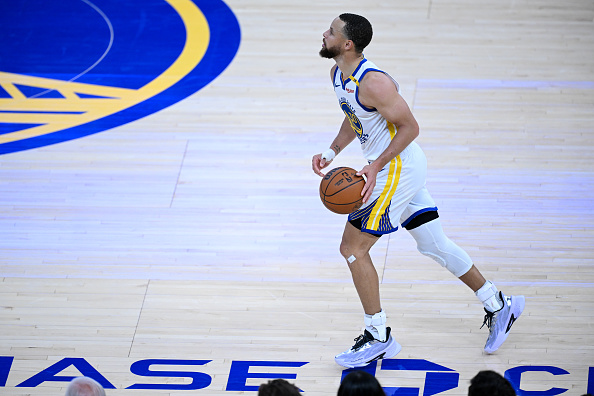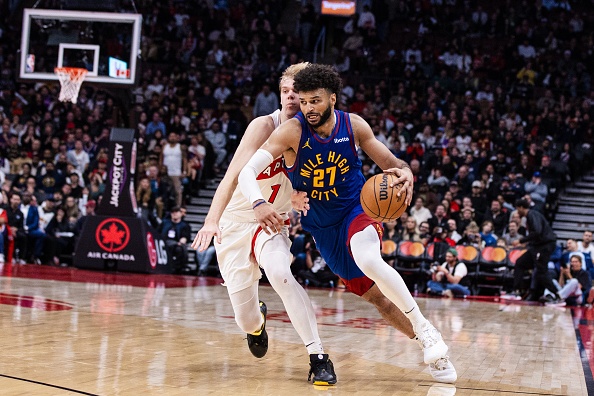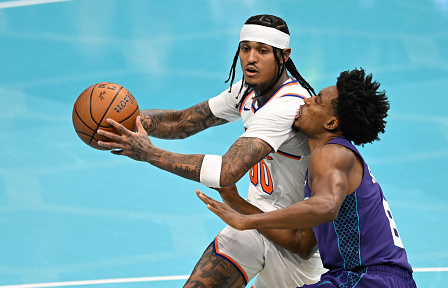The Charlotte Hornets have wallowed in a pit of mediocrity for the better part of three decades. They have never won a playoff series in their 32-year history, and they haven’t even reached the postseason since 2016, when they fell in seven games to the Miami Heat. Dealing with the limitations of a small market has certainly contributed to their lack of success, but seriously questionable management has also been a significant factor.
Majority owner Michael Jordan, general manager Mitch Kupchak, and the rest of Charlotte’s front office must have sensed their fan base’s frustration this offseason because they were much more active. Here are grades for the most critical moves they’ve made so far.
Drafting LaMelo Ball
Grade: B+
In drafting Ball, the Hornets made it known that they’re building for the future. They entered the draft with the third overall pick and a severe lack of depth at the center position, but they decided to bet on Ball to cash out on his obvious potential. The 19-year-old point guard is a streaky shooter, but he possesses a passing ability and court vision that can’t be taught. His 6-foot-8 frame and length at his position also present obvious advantages.
Ball will have to contend with returners Devonte’ Graham, Terry Rozier, Malik Monk, Cody Martin, and Caleb Martin for minutes and touches, but he’ll have plenty of time to settle into his role. Charlotte is still a fringe playoff team at best, so Ball will have some leeway when it comes to making mistakes throughout his rookie campaign.
Drafting Vernon Carey Jr. and Nick Richards
Grade: A
Continuing their trend of strong draft picks, the Hornets selected Duke big man Vernon Carey Jr. in the first round and Kentucky center Nick Richards, in the second. Charlotte ranked 26th in rebounds and 25th in blocks last season, so these picks were clearly an effort to shore up those deficiencies. Considering Cody Zeller was the only true center on their roster at the time, they almost had to scoop up some bigs.
At 6-foot-10, Carey is a more traditional back-to-the-basket big. The left-hander made a living with soft baby hooks in his lone season at Duke, where he put up 18 points and nine rebounds per game. He’s not a standout athlete, but reports of a nearly 40-pound drop in weight indicate that he may block more shots and catch more lobs at the next level.
Richards fell to the 42nd pick, but he may have just as high a ceiling as Carey. The 6-foot-11 Kentucky product played three seasons of college ball, culminating in a junior year in which he averaged 14 points and eight rebounds per contest. He doesn’t have Carey’s soft touch or finesse around the rim, but his hard-nosed finishing and explosive leaping ability may be better suited to today’s NBA.
Waiving Nic Batum
Grade: B
In the summer of 2016, the Hornets signed Nic Batum to a five-year, $120 million deal. In an offseason that became infamous for terrible contracts, Batum’s took the cake. Since then, his deal has hamstrung Charlotte’s salary cap, muddied trade talks for Kemba Walker, and lingered as a never-ending reminder of the team’s poor management. To cap off one of the worst contracts in NBA history, Batum averaged a pitiful 3.6 points in 23 minutes per game in his final season in the Queen City.
At long last, on Nov. 29, after failing to find a trade partner willing to take on the $27 million owed to Batum this upcoming season, the Hornets waived him. In doing so, in order to alleviate their own cap situation, they used the stretch provision to divide the $27 million into three payments of $9 million over the next three years. Though Batum will remain on their balance sheet through 2023, he will no longer suit up for the Hornets. That’s a win.
Trading for Gordon Hayward
Grade: C
On Nov. 29, Charlotte traded a 2022 second-round pick to the Boston Celtics in exchange for Gordon Hayward and second-round picks in 2023 and 2024. After the deal, the Hornets signed the 2017 All-Star to a shocking four-year, $120 million contract. Hayward, who is 30 years old, averaged 17.5 points, 6.7 rebounds, and 4.1 assists for Boston last season.
At face value, the Hornets easily won the trade with Boston, who clearly wanted to unload Hayward after he informed them that he wanted out. However, the deal they handed him will have similar ramifications to the one they gave Batum in 2016.
Hayward will immediately elevate Charlotte’s play on both sides of the ball and offer a much-needed veteran presence, but the cost will far outweigh the benefits here. Once again, the Hornets’ management has found a way to derail the rebuilding process in order to construct a team that will once again find itself vying for the eighth seed come April.
Re-Signing Bismack Biyombo
Grade: D
On Nov. 30, the Hornets re-signed Bismack Biyombo to a one-year, $3.5 million deal. The big man has come off the bench for Charlotte for the past two seasons, averaging seven points and six rebounds per game last season.
This move is puzzling, to say the least. After drafting two young bigs who could both contribute right away, Charlotte turned around and brought back a journeyman who will only eat into the rookies’ minutes. Biyombo has never been much of an offensive force, rarely venturing outside of the paint and almost never taking jump shots. Not only that, but at 6-foot-8 he’s still undersized compared to most NBA bigs.
Biyombo will provide energy and an intimidating presence in the paint, but Charlotte’s defensive numbers from last season indicate that his contributions on that end didn’t amount to much. His cheap contract doesn’t pose much of a risk to the Hornets’ bottom line, but re-signing him simply doesn’t make sense for a rebuilding team that just drafted two centers.
Check us out on our socials:
Twitter: @PTSTNews and @TalkPrimeTime
Facebook Page: Prime Time Sports Talk
Join our Facebook Group: Prime Time Sports Talk
Instagram: @ptsportstalk
Follow Jake Peter on Twitter @JakePeter_
Main Credit Image: Embed from Getty Images







